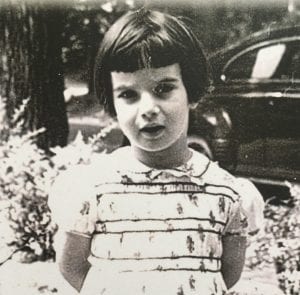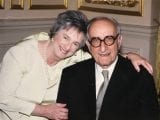- Local Survivor registry
- ANNE DOROTHY BURGER
- Local Survivor registry
- ANNE DOROTHY BURGER
Survivor Profile

ANNE
DOROTHY
BURGER
(1938-PRESENT)
PRE-WAR NAME:
ANNA DOROTHY BERGMANN
ANNA DOROTHY BERGMANN
PLACE OF BIRTH:
MUNICH, GERMANY
MUNICH, GERMANY
DATE OF BIRTH:
MARCH 19, 1938
MARCH 19, 1938
LOCATION(s) BEFORE THE WAR:
MUNICH, GERMANY
MUNICH, GERMANY
LOCATION(s) DURING THE WAR:
EDGEWARE, ENGLAND; UNITED STATES (1941)
EDGEWARE, ENGLAND; UNITED STATES (1941)
STATUS:
CHILD SURVIVOR REFUGEE
CHILD SURVIVOR REFUGEE
RELATED PERSON(S):
CARL BERGMAN - Father (Deceased),
HELEN IGLAUER BERGMAN - Mother (Deceased),
JUDITH BERGMAN HOCHBERG SISTER ,
HERBERT BURGER - Spouse (Deceased),
GABRIELLE WALBORSKY - Daughter,
CHARLOTTE WALBORSKY - Granddaughter,
JOHANNA BURGER -GREAT - Aunt (Deceased),
SIMONE ROBIN - Daughter,
THEODORE ROBIN - Granddaughter,
MAXMILLIAN ROBIN - Grandson,
EUGENIE ROBIN - Granddaughter,
ALEXANDRA VALORIE OPPENHEIM - Daughter,
SAMUEL OPPENHEIM - Grandson,
JACOB OPPENHEIM - Grandson,
ZOEY OPPENHEIM - Granddaughter
-
BIOGRAPHY By nancy gorrell
Anne Burger was born on March 19, 1938 in Munich to Carl and Helen Bergmann. Her father was in the hops business making beer that he sold throughout Europe and the United States. In 1933 Carl took a business trip to the United States. The trip proved fortuitous. At the time he opened up a substantial bank account. According to his granddaughter, Gabrielle, “He put a signficant amount of money in the account. I think he knew things could get bad.” Although the family was living a comfortable life in a Munich apartment, with the rise of Hitler and Nazism, they chose to leave Germany right before Kristallnact in September 1938. Carl had a sister, Johanna living in Edgeware, England with her husband. In the interview Gabrielle comments, “They were lucky to get there,” adding “they were away from the blitz and fairly safe.” Carl, Helen and Anne emigrated to the United States around 1940 or 1941 before Pearl Harbor. They were sponsored by a cousin who was living in the States for quite some time. Having the bank account to drawn upon was critical to their settlement and emigration status.
Anne and her parents settled in Kew Gardens on Lefferts Blvd. The apartment they took became the family home. Anne was an only child until she was six. In 1944 her sister, Judy was born. Judy was her only sibling. It was a very difficult childhood. The war was on and it was a hard time. English was Anne’s first language but her parents were speaking German whenever they didn’t want her to know what they were saying. She learned German that way. According to Gabrielle, a lot of the talk was about was about what was going on in Germany. Anne didn’t speak German but she could understand what they were saying. Carl and Helen wanted their children to be American and they only spoke English to them. Anne grew up with an apartment always filled with German Jews.
Anne went to public school and then Richmond Hill High School and Alfred University. There she majored in the sciences and then transferred to American University where she majored in political science and economics. She graduated in 1959 and later went to graduate school at the University of Edinburg, Scotland. Before she left, she met Herbert Burger at a blind date dinner party. They dated during that summer. Anne and Herbert Burger married in June of 1961. They moved to a small apartment on 38th and Park Avenue. Herbert was well established at that point working on Wall Street (Refer to Herbert Burger’s Registry).
Anne began working at Banker’s Trust in the economics department but not for long. The first of three daughters, Gabrielle was born nine months later followed by Simone in 1964 and Alexandra 1967. Once the growing family moved to Westchester, Anne became a volunteer par excellence, founding three much needed daycare centers for her community and actively participating in two synagogues, one in Harrison, the other in Manhattan.
Anne Burger and her husband of blessed memory, Herbert, are the proud grandparents of seven grandchildren as of 2021.
Editor’s Notes:
Refer to Survivor Registry, Carl Bergman for “The Story of My Life.” (1988 unpublished memoir).
Refer to Voices of the Descendants, Gabrielle Walborsky, Interview on Discovering “The Story of My Life” memoir.
-
SURVIVOR INTERVIEW with gabrielle walborsky
ANNE BURGER INTERVIEW WITH GABRIELLE WALBORSKY, DAUGHTER
DATE: MAY 17, 2021
LOCATION: WALBORSKY RESIDENCE (PHONE CONFERENCE CALL)
INTERVIEWER: NANCY GORRELL
Q: Describe your mother’s family background.
A: My mother was born March 19, 1938 in Munich outside of town. Her parents were Carl and Helen Bergmann. My grandfather Carl was in the hops business making beer. He sold the hops in Europe and in the United States. It was quite fortuitous that he took a business trip to the US at that time. In 1933 he opened up a bank account in the US. I think he knew things could get bad. He put a significant amount of money in the bank there. Carl’s assistant (name unknown) who was not Jewish helped get the papers together to get them out of Germany. Later she was killed by the Nazis. Carl and Helen lived for several years with Johanna during the war.
Q: What kind of life style did they live in Munich?
A: They were comfortable. They were living in an apartment. I don’t think they had servants. My grandmother was a house wife.Q: How did they get out of Germany?
A: My grandfather had a sister, Johanna who lived in Edgeware, England with her husband. That’s how they got out of Germany. My mother and her parents went to England from Germany in September of 38. My grandfather’s assistant who was not Jewish really helped them get papers together to leave Germany. She was very instrumental in helping them get out. I think she was killed by the Nazis because she was also helping others get out.Q: Do you know her name?
A: I don’t know her name. My grandfather wrote his story and maybe it’s in there. He made it for the family. He never published. I have it. I read it. It’s packed. I have to go to the box and find it. My great aunt also wrote her story. Maybe I can get that too.
Q: How long were they in England?
They were living there with Johanna for several years during the war. They were lucky to get there.
Q: How close was Edgeware to London?
A: It’s about a half hour from London. I’ve been there many times. They were away from the blitz and fairly safe.
Q: When did they emigrate to the US?
Around 1940 or 1941. I’m sure they left before Pearl Harbor. Having the bank account was very helpful. They ended up being sponsored by a cousin who was living in the States for quite some time. The fact that they had money and self-support helped too.
Q: What happened to your parents being in the US during wartime?
A:My mom and my parents settled in Kew Gardens on Lefferts Blvd. The apartment they took was the same apartment that my grandfather lived in until he went to assisted living in 1998.
Q: How old was he then?
A: He was 92. He died when he was just shy of 99. A very strong man. He was a great saver. He never needed much. My grandmother, a little more the other way. The apartment was not fancy.
Q: What was life like for your mom as a child?
A: My mom was an only child until she was 6. In 1944 her sister, Judy was born. My aunt was her only sibling. It was very difficult childhood. It wasn’t a happy time. Obviously English was her first language. Her parents were speaking German whenever they didn’t want her to know what they were saying. She learned German. A lot of the talk was about was about what was going on in Germany. She didn’t speak German but she could understand what they were saying. She can understand German to this day. Carl and Helen really wanted their children to be American and they only spoke English to them. Their apartment was filled with German Jews.
Q: What was your mother’s schooling like?
A: She went to public school. Richmond Hill High School. She was a tomboy and always getting into trouble.
Q: Did she ever talk about experiencing anti-Semitism growing up during the war?
A: No. she never talked about it. I don’t know if it was because there were many Jews where she lived, but she never mentioned anti-Semitism.
Q: What about in college?
A: She went to Alfred University. In college she actually got engage to a Christian man and when she met his family, the kind of family whose lineage went back many centuries, she felt out of place, she didn’t feel his family’s support for the marriage. She realized the marriage was not going to work. My best recollection is that this may have been a first experience with anti-Semitism. She broke off the engagement and transferred to American University in Washington, DC.Q: What was she pursuing?
A: Originally, at Alfred she majored in the sciences, but at American she majored in political science and economics. When she graduated in May of 1959, she moved back home to Kew Gardens. She went to graduate school at the University of Edinburg, Scotland.
Q: When or how did she meet your father?
A: Before she left, she met Herbert Burger at a blind date dinner party. They dated during the summer and then she left. They got married in June of 1961.
Q: Where did they settle?
A: They moved to Manhattan. They lived in a small apartment on 38th and Park Avenue. My father was well established at that point working on Wall Street.Q: What was your mother doing?
A: She worked at Banker’s Trust in the economics department but not for long.
Q: What happened next?
A: I was born nine months later. Back in those days if a woman was pregnant, she couldn’t work for long. So, she had to leave as soon as she began to “show.” After that she became a housewife.
Q: What was later post-war life like for your mother?
A: Once we moved to Westchester, she became involved as a volunteer in the community. She founded three daycare centers in the town because she saw the need. She wrote a book on relationships. She also went to Pace University in computers science and ended up working for professors.
Q: Were you an only child?
A: My sister Simone was born two and a half years after me in 1964. Alexandra was born in 1967. My mother was very involved in raising children and giving back to the community. She was involved with strong women in our town and put together daycare.
Q: How was post war life?
A: Very good. My parents were huge participants in the arts. They went to New York City three or four times a week to art openings, galleries, museums, opera, classical music. They were extremelly cultured.
Q: What about synagogue life?
A: They were very active. They belonged to two congregations. One was JCC of Harrison and the other was Congregation Habonim in Manhattan.
-
Sources and Credits:
Credits:
SSBJCC Survivor Registry Interview with Gabrielle Walborsky; Interviewer: Nancy Gorrell; Digital historic and family photographs donated by Gabrielle Walborsky.




